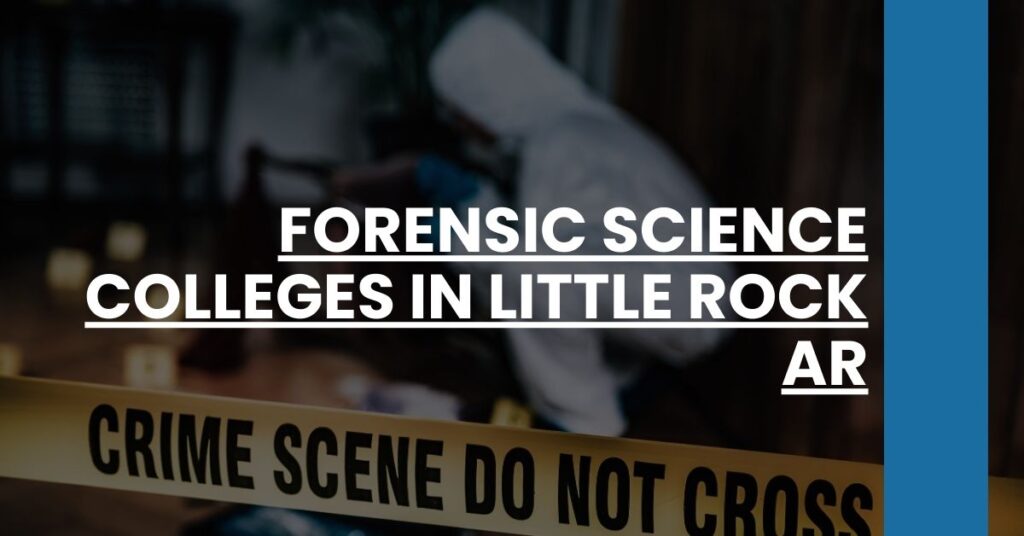Not in Little Rock? Check out our lists of Forensic Science Colleges in Fayetteville, Fort Smith, Jonesboro, Springdale, and across Arkansas.
Top Forensic Science Colleges in Little Rock AR
Which forensic science college in Little Rock, AR is right for you?
This article highlights the best options, covering programs, hands-on experiences, and expert faculty that can set you on the path to a successful forensic career.
Choose the right institution to meet your educational goals and career aspirations.
University of Arkansas for Medical Sciences – Forensic Psychiatry Fellowship Program
The University of Arkansas for Medical Sciences (UAMS) offers an esteemed Fellowship Program in Forensic Psychiatry. This program is ACGME-accredited and provides in-depth training that prepares you for certification in forensic psychiatry.
Key Features:
- Board Eligibility: Gain eligibility for the forensic psychiatry board upon completion.
- Diverse Evaluations: Participate in assessments at the Arkansas State Hospital Forensic Unit.
- Various Experiences: The Fellowship offers exposure in correctional psychiatry and civil cases such as:
- Comprehensive Didactic Curriculum: Includes forensic psychiatry principles, law aspects, and case conferences on forensic issues, allowing for an enriched educational experience.
The program is open to candidates who have completed a certified four-year general psychiatry residency and are eligible for an Arkansas State Medical License. Contact the Program Director, Dr. Ben Guise, or the Program Coordinator, Janis Cockmon, for further details.
Explore the Forensic Psychiatry Fellowship Program at UAMS to take a decisive step in your forensic psychiatry career.
University of Arkansas at Little Rock – Bachelor of Science in Forensic Science
The University of Arkansas at Little Rock (UALR) offers a Bachelor of Science in Forensic Science renowned for its balanced approach of theory and hands-on experience.
Program Highlights:
- State-of-the-Art Laboratories: Work in cutting-edge labs that simulate real-world forensic environments.
- Practical Internships: Gain real-world experience through internships and cooperative education programs.
- Expert Faculty: Learn from experienced professionals in various forensic fields providing guidance and mentorship.
- Strong Community Relationships: Leverage UALR’s connections with local law enforcement and forensic labs for:
- Small Class Sizes: Benefit from personalized attention in small class settings.
Despite higher tuition and fees compared to other state options, UALR’s program stands out with its rigorous academic structure and practical experiences that offer significant value.
Dive deeper into the Bachelor of Science in Forensic Science at UALR to discover how this program can prepare you for a rewarding forensic science career.
University of Arkansas for Medical Sciences – Forensic Pathology Fellowship
The University of Arkansas for Medical Sciences (UAMS) offers a one-year, ACGME-accredited Forensic Pathology Fellowship in partnership with the Arkansas State Crime Laboratory.
Key Features:
- High Volume of Autopsies: Gain experience by performing numerous autopsies across Arkansas’s 75 counties.
- Diverse Forensic Disciplines: Engage in neuropathology, criminalistics, ballistics, forensic toxicology, and more.
- Advanced Facilities: Utilize five autopsy stations, full-body radiology, histology services, and access to anthropology and forensic odontology consultants.
- Planned Relocation: A modern facility at Camp Robinson in North Little Rock is set for 2027, enhancing educational infrastructures.
- Teaching Opportunities: Fellows also teach medical students and residents, adding a valuable dimension to their training.
- Research and Conferences: Engage in meaningful research and present findings at national conferences.
This fellowship is designed for individuals who have completed residencies in anatomic or anatomic/clinical pathology and are either board-certified or board-eligible. Ideal candidates should contact Theodore Brown, M.D., or Teddi Tubre, M.D., for more information.
For more details on this Forensic Pathology Fellowship, click here.
What to Look for When Choosing a Forensic Science College
Choosing the right forensic science college is crucial. Here’s what to consider:
- Accreditation: Ensure the program is accredited by a recognized accrediting body. This guarantees academic and professional standards.
- Faculty Expertise: Look for faculty with significant field experience and strong academic credentials.
- Hands-On Training: Opt for colleges that offer internships, lab work, and field experiences.
- Comprehensive Curriculum: The program should cover biology, chemistry, law, and specialized forensic techniques.
- Career Support Services: Investigate job placement assistance, career counseling, and networking opportunities with professionals and alumni.
- Graduate Success Rates: Look into job placement rates and career advancement of graduates from the program.
- Campus Resources: Consider the availability of state-of-the-art labs, libraries, and technology.
- Location and Cost: Ensure the college fits your preferences and financial situation.
- Class Sizes: Smaller classes often provide more personalized attention and better learning experiences.
These steps will help you make an informed decision and choose the best forensic science college for your needs.
Wrapping Up Your Forensic Science Education Journey
Carefully selecting a forensic science college is essential for your career success. Reviewing the programs at UAMS and UALR highlights the importance of accredited, hands-on training, expert faculty, and career support.
Take the next step in your forensic science education and choose a program that aligns with your career aspirations and personal needs.

